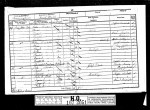When you have information about your ancestors which takes you back at least one hundred years, you can start using census records, and in this article I will discuss using the British census online.
Since the arrival of the internet has been much easier to look at census details. All of the census reports from 1841 to 1911 are digitally indexed and published online.
Searching the Census Records
There are various ways of searching online. If you have a subscription to www.ancestry.co.uk, this is probably the best place to use (they offer a two week free trial if you are not already a member). Or you can use www.findmypast.com. They also have a free trial period.
As always in family history, you should start with the most recent records and work backwards. Therefore, if you know your ancestor died in about 1903, you would start with the 1901 census, and after noting the details from that, you would go to the 1891 census and so on.
You can search online census records in two ways, either by using a name search, or by searching a single parish. The name search is the most useful because you do not need to know where they were resident at the time – but in this case you do need to have some idea of age. If your ancestor has a very common name, it can be very difficult if you only have a small amount of information to enter into the search engine, and you may find there are hundreds of results for that name. Try to get as much information as possible about your ancestor before doing a search.
Always give at least two years either way for a person’s age, as these details can often be inaccurate.
If you do not find your ancestor on the census straight away, try searching with the “exact spelling” switched off, but don’t rely on this. Try as many different spellings as you can. Name spellings were not always standardized, and there were also many errors made when transcribing the information to the indexes. I eventually found my grandfather, Francis Manley’s details in the 1881 census listed as “Fracis”!
What’s in the census?

1851 Census
There is much exciting information to be found in the census records. As well as giving you information about your personal ancestors, they are a great social history resource and reveal fascinating information about how our ancestors lived in the 19th and early 20th centuries.
The census started in 1801, but it is only since 1841 that the details became useful for family historians because that is the first time they used names. However, this particular census is limited in its information, and subsequent censuses gave more detailed information.
From 1851 the censuses gave the following information:
• Place (and sometimes the address) of individuals
• Their ages at the time of the census
• Who was living in the household
• How each person is related to the head of the household
• Place of birth of each individual
• Occupation
From this information, you can understand much about how your ancestor lived, what size of house they lived in and how many servants they had (if any). All these things can give clues to their income and status.
The 1841 census does not give information about relationships within the household, and the place of birth is only whether an individual was born within the county or not. It is also important to remember that the ages given are to the nearest five, so if your ancestor was 23, his/her age would be given as 20.
By searching all the censuses that an individual was involved in during their lifetime, you can build up an idea of their life story, and also get information about spouses, children and any other relatives that were living with them. If the ancestor you are searching was a child during the census, you will usually be able to find details of their parents and thus go back another generation in your family tree.
You can also get an idea of how much ancestors have moved around the country by looking the places of birth of their children.
Being able to study the British Census online has been a major boon to genealogists in the past few years. However, do be aware that there are many errors in the transcriptions, so keep trying if you do not find your ancestors straight away, and always try and back up the information through other sources.

